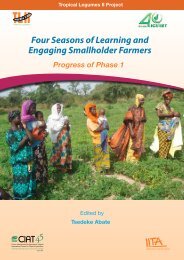Download - icrisat
Download - icrisat
Download - icrisat
You also want an ePaper? Increase the reach of your titles
YUMPU automatically turns print PDFs into web optimized ePapers that Google loves.
95<br />
And for all that, on 29 March 1999, Time listed her among ‘Time 100,’ the magazine honoring ‘The Great Minds Of<br />
The Century’ (time.com).<br />
So I want to speak openly about living and dying on this planet, of this planet. While Terra Cognita is not yet<br />
terminally ill, we must now recognize that we have to talk globally and locally about life and death, the Eternal<br />
Circle, and that, learning from Ms Elisabeth, in fact we can for instance apply the concept of Living Wills to<br />
mitigate global warming.<br />
Living Wills for Climate Change can be in the form of grants for projects for R&D in biofuels, and loans for enterprises<br />
to encourage villagers to blanket Planet Earth with gas-guzzling green monsters - that is to say, plants harvesting<br />
carbon dioxide from the air, decreasing air pollution. An intelligent species nursing wastelands back to life with its<br />
own refuse; for this, we already have the crop: Sweet Sorghum.<br />
In 2002, FAO called it the ‘camel among crops’ because it can<br />
Living Wills for Climate Change<br />
can be in the form of grants for<br />
projects for R&D in biofuels, and<br />
loans for enterprises to<br />
encourage villagers to blanket<br />
Planet Earth with gas-guzzling<br />
green monsters - that is to say,<br />
plants harvesting carbon<br />
dioxide from the air,<br />
decreasing air pollution.<br />
grow in problem soils: dry or wet, salty or sweet (fao.org). A<br />
Survivor Crop. We must learn from the camel and be a Survivor<br />
Species.<br />
Now I dare say global warming is the best thing that ever<br />
happened to farmers in the tropics, for now they have to face<br />
the reality that they can no longer be profligate with water, and<br />
they can plant a survivor crop where no other crop dare grow.<br />
Sweet Sorghum? In the United States, Sorgo used to be big; in<br />
1888, the total US production was 20 million gallons of syrup,<br />
mostly from family farms in neighborhoods with one farmer with<br />
a mill for squeezing the canes and an evaporating pan for cooking<br />
the syrup (Ken Christison & Keith Kinney, 2002,<br />
herculesengines.com). Kentucky syrup alone in 1994 was worth<br />
$8 M, a mere half of Kentucky’s potential (Morris J Bitzer,<br />
ca.uky.edu). According to Morris, community Sorgo projects of one or more counties are becoming common.<br />
Family farms and community projects - the Sorgo potential is all there. They are all to the good - if only we can<br />
bring ourselves to graduate from the stages of Denial of Global Warming to Anger to Bargaining to Depression to<br />
Acceptance. I’m thinking you don’t know global warm if you are in a cold country. That is bad enough. You don’t<br />
know global hot until you are in the tropics, such as the Philippines. It’s badder such as it is.<br />
I’m half naked as I write this, and it’s May, traditionally the onset of the rainy season, and it’s only 0944 hours in<br />
Manila. I’m actually in good old cool Los Baños, not anymore the summer capital of Southern Luzon. The air is dry<br />
and hot even inside the apartment. If you don’t call this global warming, you’re using a different language. Or you<br />
don’t call a spade a spade.<br />
The Children Of Maidanek

















